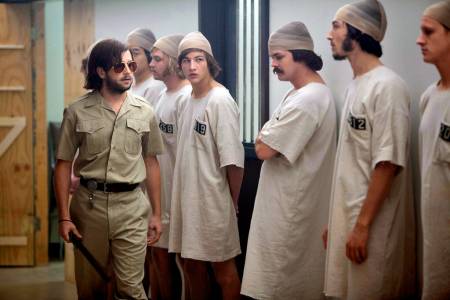Kyle Patrick Alvarez: The Stanford Prison Experiment (2015)
ANGARINO, SHERIDAN, EZRA MILLER (GOATEE), ET AL. IN STANFORD PRISON EXPERIMENT
Recreating Stanford University psychology professor Philip Zimbardo's famous experiment
Considering how famous this event is (it's included in many textbook introductions to psychology) it's surprising it's taken over four decades for an original American feature film to be made about it.* After waiting so long, we might have expected a slightly better movie; but this one is nonetheless brutally effective.
As is well known, in the summer of 1971 Zimbardo and his assistants solicited student volunteers, then arbitrarily divided them up as designated "prisoners" and "guards" and placed them in a fabricated "prison" situation to see how they would behave. The test exceeded Zimbardo's wildest dreams. Placed in uniforms and wearing dark classes, the "guards" quickly became abusive brutes; in humiliating prison gowns with their names replaced by numbers, the "prisoners" turned into passive victims willing to collaborate against their fellows. Zimbardo himself was sucked into the invented system, turning, with aid from a black ex-con, into a stone cold "prison superintendent" who was reluctant to intervene, not to say gleeful, even when the situation was obviously getting more and more terribly out of hand. Given the obvious analogies to the Abu Ghraib revelations, the recent controversy over psychologists collaborating in US government torture, and the scandal of America's vastly over-expanded prison system, this movie is more relevant than ever.
Kyle Patrick Alvarez's movie has enlisted Billy Crudup as Zimbardo and Michael Angarino as his preening, over-the-top young head "guard," as well as hot young actors, especially Ezra Miller, Tye Sheridan, Logan Miller and Thomas Mann, to play the most visible "prisoners." Olivia Thrilby is effective as Dr. Christina Maslach, Zimbardo's younger colleague and temporarily recalcitrant girlfriend. Given the circumstances -- would not such an experiment be considered scandalous today? -- it is surprising that Zimbardo has dined out successfully ever since on this somewhat dubious career "highlight." Repetitious and at times crudely edited, Stanford Prison Experiment feels for the most part more like an unusually well-acted simulation than a real drama. Still, given the significance and the cast and the relevance of the subject, this is nonetheless one of the year's must-see films.
According to Joe Neumaier of the Variety, calls "the more permissive, laissez-faire era of university-sponsored scientific research." Obviously the time of Zimbardo's experiment was equally over-liberal.
And also, as Maria Konnikova points out in a recent New Yorker article, the work of Zimbardo has been interpreted over-simplistically as showing that authority automatically produces brutality. In fact, she explains, Zimbardo's experiment "wasn’t a blank slate; from the start, its goal was to evoke the experience of working and living in a brutal jail."** This is not adequately conveyed in the movie, which is patchy in depicting the experiment's setup. Still, Alvarez's movie provides a lively enough viewing experience to serve as a stimulus to debate and further study of the issues involved. Such study should include investigation of this project's sponsorship by the Navy, and Zimbardo's longtime, continuing association with the military and more recently the Department of Homeland Security.
Among the performances (and roles as presented by screenwriter Tim Abbott) Ezra Miller is most fascinating as the feistiest "prisoner" most ready to revolt, then most disturbed by his abusive treatment; Tye Sheridan deeply sympathetic as a cowed, hurt victim. Neumaier may be right in saying that Crudup as Zimbardo is burried in "fretting and sanctity" and Angarino is allowed too much "scene-chewing," substituting panache for complexity in a key role. But the movie seems to err more in representing the experiment as a whole. Still, nothing Alvarez does wrong can neutralize this strong young cast and the shocking circumstances they recreate here.
The Stanford Prison Experiment, 122 mins., Alvarez's third feature, debuted Jan. 2015 at Sundance, receiving the Waldo Salt Screenwriting Award and the Alfred P. Sloan Feature Film Prize; US theatrical release by IFC began 17 July 2015. Landmark Cinemas Embarcadero San Francisco 24 July, also VOD.
_____________
*A.A. Dowd's AV Club review points out there have been "several previous cinematic treatments, including a documentary, a heavily fictionalized German drama, and an American remake of said German drama." For some actual footage of Milgrim's and Zimbardo's experiments closely followed by Alvarez see this half hour BBC film on YouTube.
**See Psychology Today article by Peter Gray similarly explaining why the Stanford Prison Experiment is not included in his basic psychology text. Gray accuses the experiment of being rife with "demand results," meaning despite the experimenters' claiming to be surprised, the subjects on both sides were only doing what they could easily intuit was expected of them.
See also a blog reporting objections of Carlo Prescott, the actual San Quentin ex-convict who was a major consultant and advisor for the Stanford Prison Experiment, then detached himself from it. Contrasted with how Philip Zimbardo still tweaks his picture of the experiment.





 Reply With Quote
Reply With Quote
Bookmarks